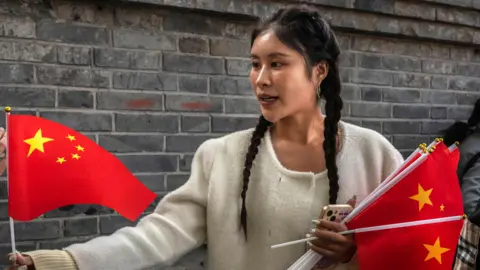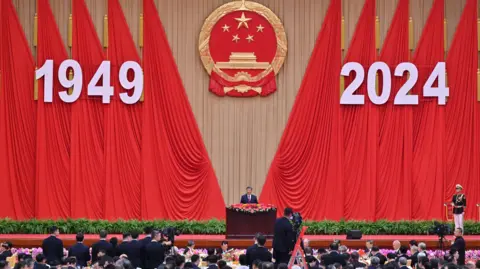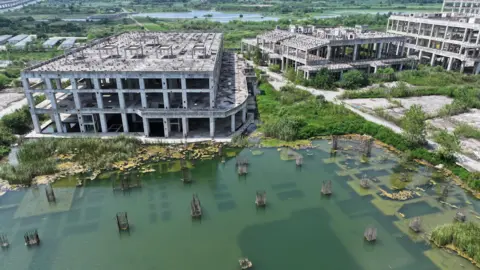 Getty Images
Getty ImagesAs China prepares to celebrate the Golden Week holiday and celebrate the 75th anniversary of the founding of the People’s Republic, the ruling Communist Party has issued a raft of measures aimed at boosting its faltering economy.
The plans included helping the country’s crisis-hit real estate industry, supporting the stock market, cash grants to the poor and increasing government spending.
Stocks in mainland China and Hong Kong achieved record gains after these announcements.
But economists warn that the policies may not be enough to fix China’s economic problems.
Some of the new measures announced by the People’s Bank of China (PBOC) on September 24 were aimed squarely at the country’s battered stock market.
The new instruments included 800bn yuan ($114bn; £85.6bn) of financing that insurers, brokers and asset managers could borrow to buy shares.
People’s Bank of China Governor Pan Gongsheng also said the central bank would provide support to listed companies that want to buy back their shares and announced plans to reduce borrowing costs and allow banks to increase their lending.
Just two days after the People’s Bank of China’s announcement, President Xi Jinping chaired a surprise, economy-focused meeting of the country’s top leaders, known as the Politburo.
Officials promised to intensify government spending to support the economy.
On Monday, the day before China headed for a week-long holiday, the benchmark Shanghai Composite Index jumped more than 8%, its best day since the global financial crisis in 2008. The move capped a five-day rally that saw the index rise by 20%. .
The next day, with markets on the mainland closed, Hong Kong’s Hang Seng Index rose by more than 6%.
“Investors loved these announcements,” China analyst Bill Bishop said.
While investors may be popping champagne corks, Xi has deeper issues to address.
 Getty Images
Getty ImagesThat the People’s Republic is celebrating its 75th anniversary means it has been in existence longer than the only other major communist state – the Soviet Union – which collapsed 74 years after its founding.
“Avoiding the fate of the Soviet Union has long been a key concern for China’s leaders,” said Alfred Wu, an associate professor at the Lee Kuan Yew School of Public Policy in Singapore.
At the forefront of officials’ minds will be boosting confidence in the broader economy amid growing concerns that it may fail Its annual growth target is 5%.
“In China, goals must be achieved by any means necessary,” said Yuen Yuen Ang, a professor of political economy at Johns Hopkins University.
“Leadership is concerned that failure to meet them in 2024 will exacerbate the downward spiral of slow growth and low confidence.”
One of the main drawbacks for the world’s second-largest economy has been the downturn in the country’s real estate market that began three years ago.
Aside from policies aimed at boosting stocks, the recently unveiled stimulus package also targeted the real estate sector.
It includes measures to increase bank lending, lower mortgage interest rates, and lower minimum down payments for second-home buyers.
But there are doubts that such moves are enough to support the housing market.
“These measures are welcome, but they are unlikely to change things much in isolation,” said Harry Murphy Cruz, an economist at Moody’s Analytics.
“China’s weakness stems from a crisis of confidence, not a credit crisis; companies and households do not want to borrow, no matter how cheap it is.”
At the Politburo session, the leaders pledged to move beyond interest rate cuts and tap government funds to boost economic growth.
However, beyond setting priorities such as stabilizing the property market, supporting consumption and boosting employment, officials have provided few details on the size and scope of government spending.
“If fiscal stimulus falls short of market expectations, investors may be disappointed,” warned Qian Wang, chief economist for Asia-Pacific at Vanguard.
“In addition, periodic political stimulus does not solve structural problems,” Wang noted, noting that without deeper reforms, the problems faced by the Chinese economy will not disappear.
Economists believe that addressing entrenched problems in the real estate market is key to reforming the broader economy.
Real estate is the largest investment most families make, and falling house prices have helped undermine consumer confidence.
“Ensuring the delivery of pre-sold but incomplete homes will be key,” said a note from Sophie Altermat, an economist at Julius Baer.
“In order to increase domestic consumption on a sustainable basis, fiscal support for household income must go beyond one-time transfers, and come through improved pension and social security systems.”
 Getty Images
Getty ImagesOn the 75th anniversary day, an editorial in the state-controlled People’s Daily struck an optimistic tone, acknowledging that “although the journey ahead remains difficult, the future is promising.”
According to the article, concepts pioneered by President Xi such as “high-quality development” and “new productive forces” are the key to opening this path to a better future.
The focus on these ideas reflects Xi’s quest to shift away from the fast drivers of growth of the past, such as investment in real estate and infrastructure, while trying to develop a more balanced economy based on cutting-edge industries.
The challenge for China, according to Ms. Ang, is that “the old economy and the new economy are deeply intertwined; if the old economy falters too quickly, it will inevitably hinder the rise of the new economy.”
This is what the leadership has realized and is responding to.”

“Internet practitioner. Social media maven. Certified zombieaholic. Lifelong communicator.”


